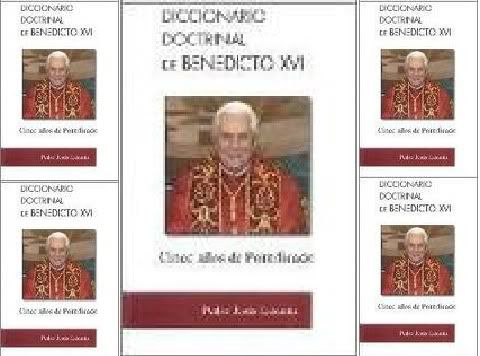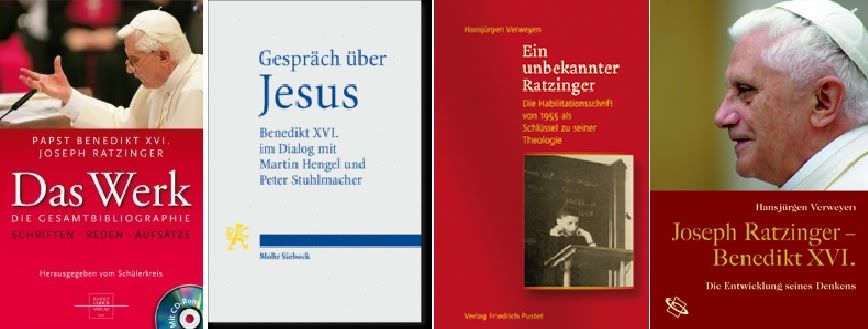 The first great 'dictionary'
The first great 'dictionary'
of Benedict XVI's teachings
by Massimo Introvigne
Translated from

January 15, 2011

Pedro Jesús Lasanta, a Spanish diocesan priest and author of many works on the Magisterium, has offered us an extraordinary work. His
Diccionario doctrinal de Benedicto XVI: Cinco años de pontificado (Doctrinal dictionary of Benedict XVI: Five years of his Pontificate)(Editorial Horizonte, Logroño 2010) is an encyclopedia of the first five years of Benedict XVI.
Except for a brief introduction, This truly monumental work - 1,580 pages - does not contain any comment by the compiler. The alphabetized subjects, from 'Abandonment to the will of God' to 'Volunteer work', passing through themes like "the Rosary', 'organ donation', 'ecology', 'homosexuality' or 'jails', correspond to a compilation in chronological order of passages from Benedict XVI's texts and discourses.
In all, there are 5,161 citations, numbered from 1 to 5,161 for faster reference. The most important topics are subdivided into sub-themes. For example, the theme 'Prayer' is subdivided into 'The action of the Holy Spirit on the soul', 'The importance and necessity of prayer', and 'Components oand expressions of the spirit in prayer".
The work is valuable as an immediate and practical reference on the teaching of Benedict XVI on hundreds of topics that he has touched upon in the first five years of his Pontificate. Obviously, an encyclopedic dictionary of this kind cannot be 'summarized'.
But one can try to cite, at least by way of exa,ple, some theme or some central concern which, so to speak, governs the hierarchy of topics. Under 'Relativism', there are 22 citations.
One might recall that on April 18, 2005, Cardinal Joseph Ratzinger, in his homily for the Mass
pro eligendo Pontefice before the Conclave opened which he celebrated as Dean of the College of Cardinals, had first introduced the phrase 'dictatorship of relativism' that quickly became famous.
"How many winds of doctrine", said he, "have we known in recent decades, how many ideological currents, how many ways of thinking. The small boat of the thought of many Christians has often been tossed about by these waves - flung from one extreme to another: from Marxism to liberalism, even to libertinism; from collectivism to radical individualism; from atheism to a vague religious mysticism; from agnosticism to syncretism and so forth... "
"Today, having a clear faith based on the Creed of the Church is often labeled as fundamentalism. Whereas relativism, that is, letting oneself be 'tossed here and there, carried about by every wind of doctrine', seems the only attitude that can cope with modern times. We are building a dictatorship of relativism that does not recognize anything as definitive and whose ultimate goal consists solely of one's own ego and desires".
In Don Lasanta's dictionary, which does not cite texts by Cardinal rAtzinger before he became Pope, to which he previously dedicated a similarly monumental work, we can appreciate how the Pope has frequently returned to the core of his April 18, 2005 homily.
The theme is central in all of his Magisterium. Through any means including violence, and with an enormous propaganda apparatus which threatens to crush any opposition, the proponents of relativism today continue to seek to impose the new dogma according to which truth does not exist - that only opinions and desires do. It is a world in which everything is considered right, and therefore nothing is.
Worse, even reason no longer exists, at least not in the classic sense, which, as the Pope reminds us, comes from the Greek legacy which was nurtured and defined by Christianity as an instrument capable of recognizing reality and its truth.
What remains today is a reason that is instrumentalized, which is no longer measured by what is true but by what is useful. The errors and horrors of modernity have shown this instrumentalized reason as a violent reason.
If the unit of measure is not what is real but that which 'succeeds', then the 'reason that has reason' is that which wins out, which shouts the loudest and which eliminates the opposition because it has more power or money, because it has a stronger army or bombs that are more powerful.
The passages in the Dictionary that are dedicated to religions, to religious freedom, to inter-religios dialog, confirm how Benedict has dedicated his Pontificate to fighting both fundamentalism, in which a hypertrophy of faith leads to an elimination of reason, and to laicism or secularism, where the hypertrophy of reason eliminates faith.
In both cases, the human experience is diminished and ultimately fails, and history is stained by blood generated by a violence that no one is able to control any more.
In theory, others [besides the Ctholic Church] have the task of defending reason. But the corrosive action of relativism is such that today, reason finds few friends and defenders. And here is where Benedict XVI enters the arena in the name of reason, with the teachings cited in the sections undr 'Reason" and 'Rationalism'.
Indeed, without natural truths, there cannot be the possibility of being open to supernatural truths. If reason, which first became rationalism and then relativism, refuses to recognize that truth exists, then it will not recogzine any truths at all, much less, truths of a religious nature.
The Pope of faith as well as reason, Benedict XVI has transmitted to us, in his first five years alone, a Magisterium that is infinitely rich. Don Lasanta's work, which one hopes will soon have an Italian edition, gives us within one volume a measure of this richness.
Here is an earlier review of the book by another Spanish diocesan priest (it is remarkable and unusual not just how many books are written about Benedict XVI in Spain but how many diocesan priests are writing these books!) Fr. Morado holds a doctorate in theology from the Pontifical Gregorian University and writes a blog called 'Puerta de Damasco' (The Damascus Gate) for the excellent Spanish Catholic website Infocatolica.
May there be more years -
and volumes - of these teachings
from our present Pope!
by Guillermo Juan Morado

November 9, 2010
Pedro Jesús Lasanta is a priest in Logroño, with doctorates in canon law, theology and civil law, who is the author of many other books published by Horizonte.
His
Diccionario doctrinal de Benedicto XVI is an ambitious work which seeks to bring the Holy Father's teachings in a convenient way to the wider public. The various topics - from 'abandonment' to 'volunteer work' - assemble a selection of texts from the Pope about these specific topics: altogether 5,161 passages of varying lengths from Benedict XVI's texts,
The general index, at the start of the book, has a complete list of these topics. The analytic Index (pp 1451-1575) assembles at the end the epigraphs of every citation made.
Father Lasanta has done what many of us would have wanted to do: To elaborate an ample dossier that gathers the teachings of this Pope on several subjects. A desirable task, without a doubt, but which would daunt most of us before being able to undertake it.
The author of this 'dictionary' has faced the challenge competently and successfully. Each selected citation has the date and origin or occasion for the text, making clear if it comes from an address, a homily, an encyclcial, etc.
It provides a tool that is most useful for study purposes as well as a guide for pastoral activity. It is true that the papal texts are easily accessible on the Vatican website, but without the aid of something like this Dictionary, it is almost impossible to recall what Benedict XVI has said or written about a topic and how often.
Ultimately, without taking anything from Fr. Lasanta's effort, the greatness of this Dictionary reflects the greatness of the Pope's thinking - which is mature and profound, which unites beauty of words with the certainty of expressing well and intelligibly the content of the faith.
One can only congratulate the author of this initiative. One can only hope that successive volumes of this Dictionary will assemble many more years of teaching by our current Pope!
THE RATZINGER 'WORK':
Beyond the 'Collected Works'
Unfortunately, I have not been able to keep up with the books coming out about Benedict XVI even if I limited it only to those written in the ew languages that I can read.
But one assumes the Ratzinger Schuelerkreis is doing that, as it has done for everything he wrote for publication - articles included, and in all languages - until he became Pope. That is available in DAS WERK (The Work), published by the Schuelerkreis in September 2009.

- DAS WERK is a 448-page bibliography that also provides a summary of the content of each book or article. It is edited by Vincenz Schnur, who studied under Prof. Ratzinger in Tuebingen. Available only in German, the book sells for about 60 euro. Two other recent publications by the Schuelerkreis are:
- GESPRAECH UEBER JESUS, published in 2010, which presents the texts and discussions of the 2008 Schulerkreis seminar in Castel Gandolfo about the person of Jesus of Nazareth, with German Biblical scholars Martin Hengel and Peter Stuhlmacher as resource persons. The seminar took place while Benedict XVI was completing Vol. 2 of his Jesus book. The Schuelerkreis book is said to serve as a hinge between the two volumes of JON.
- EIN UNBEKANNTER RATZINGER, published in 2010, written by Hansjuergen Vermeyen, another SK member and a theologian who has written several books including biographies of St. Anselm of Canterbury and Karl Rahner. He writes about Joseph Ratzinger's unabridged 1955 Habilitation dissertation as the key to his theology and his work in the Second Vatican Council.
- Also illuistrated above is JOSEPH RATZINGER/BENEDIKT XVI: Die Entwicklung seines Denkens (The development of his thought), an earlier book by Verweyen, published in 2007.
[Modificato da TERESA BENEDETTA 17/01/2011 13:32]